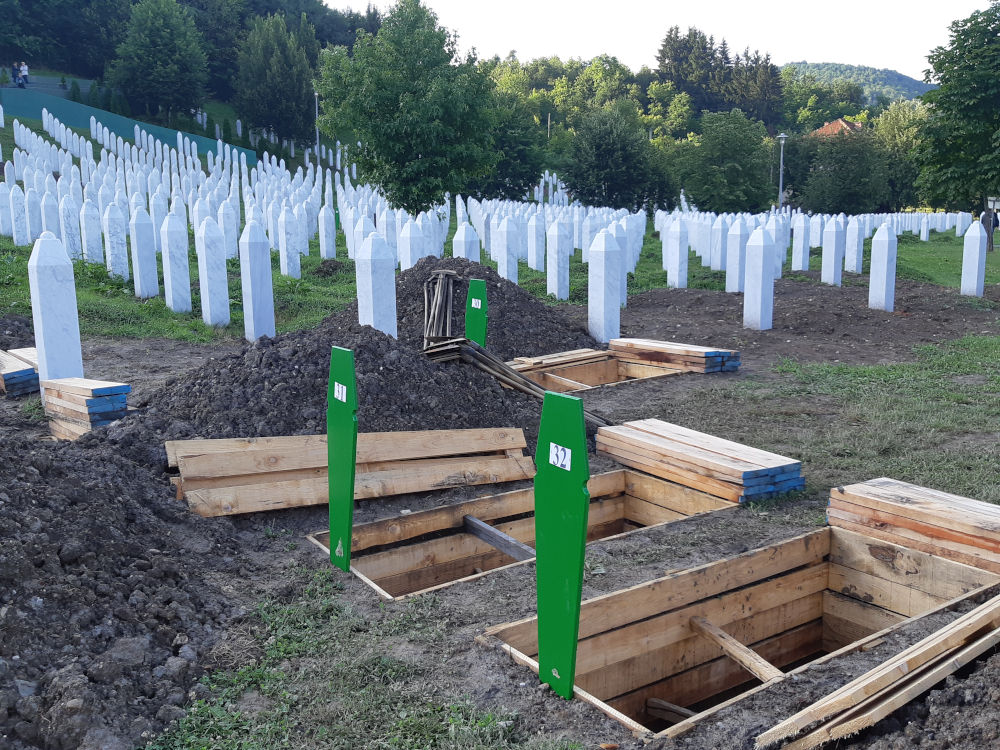
Another 33 victims of the Srebrenica genocide were buried this year at the Potocari Memorial centre. Not one official from Belgrade attended the event, or the annual commemoration of the atrocity. This lack of attendance, quite expectedly, made the news and drew media attention. The prime minister of Serbia responded laconically, saying she wasn’t going to Potocari because she “wasn’t invited.”
To those familiar with local affairs it was of course clear that PM Brnabic sat in Belgrade through this year’s commemoration for entirely different reasons. The party that delegated her to the office, the one she is soon to join and whose president is her mentor, actively supports convicted war criminals and their wicked deeds. A long line stretches from Aleksandar Vucic’s ‘100 Muslims for one Serb’; to his initiative for naming one of Belgrade’s boulevards after Ratko Mladic; to state and party engagements of convicts such as Lazarevic, Sljivancanin and Seselj; all the way to the public statements of party officials greeting the “liberation of Srebrenica” as a just and liberating action of the Republika Srpska army.
Despite the tough competition in normalising state sponsored murders, Brnabic herself strives to keep up with the contest – like in her recent statement that in her personal opinion there was no genocide in Srebrenica. It was this “personal opinion” – and not the lack of invitation – that forced the prime minister to stay at home yesterday. This also explains the absence of an invitation for her presence in Potocari (if attending such events requires any invitation at all – which is a separate subject). Denial of genocide is not a terminological, but a substantial issue – opting for a qualification different than the one established in court actually points to a dismissal of how organised and systematic the crime was, as well as of the role of the very top of the Serbian government in its execution.
Another set of reasons for the state officials not wanting to be in Srebrenica stems from the fragility they demonstrate every time they are reminded of reality, whether in the domestic or international setting. Why would Vucic or Brnabic stand still during the speeches in Srebrenica that, among other things, this year voiced a stance that the denial of genocide and praising criminals are a special form of posthumous crime against the victims, adding that the Serbian political and religious elites refuse to accept the facts established by courts and to distance themselves from the ideology that created the genocide. Serbian officials even refuse to hear arguments that such actions damage their own people the most, projecting guilt and responsibility on all for the crimes committed by the politics of Milosevic and Karadzic. They don’t want to hear the conciliatory messages of the survivors either – that the Serbian people need to relieve themselves and their offspring from the burden of the past and the wars. It would only remind them of the warmongering speech they use lavishly today as well.
Ana Brnabic is trying to be a better Radical than the Radicals, we are slowly getting used to that. That’s why her getting potentially upset by the speeches in Srebrenica was not a big surprise. What did cause disbelief was that Brnabic, while justifying her absence, brazenly reminded the public that “no one has yet been held accountable for the attack against Aleksandar Vucic in Potocari.” In 2015 he visited Srebrenica and then, said Brnabic, he was “attacked and his life was endangered.” That’s not a good message for regional cooperation, the prime minister concluded.
This statement could be dissected on several levels, but let’s start with the fact that in 2015 Vucic was indeed hit by rocks in Potocari, but in all this time there has been no evidence that his life was endangered. In just a matter of seconds he was under protective umbrellas and removed from those that could potentially hurt him. Despite that, Brnabic sees this attack with rocks as a regional problem, while the murder of more than 8,000 people she sees as a random crime, of no particular regional importance, and one that doesn’t require her special attention.
Thus the regional silence and cynical euphemisms from Belgrade officials about Srebrenica victims are broken by the cry of the only victim Serbian officials recognize. His name is Aleksandar Vucic.
Brnabić didn’t go to Potocari because she wasn’t invited, while Vucic is absent from Srebrenica because he was already murdered there a long time ago, we just weren’t informed. Still today, patient as he is, this man waits for justice. This is how he perversely assumes the role of the oppressed – a favourite game of most bullies and criminals.
Translated by Milica Jovanovic
Peščanik.net, 24.07.2019.
- Biografija
- Latest Posts
Latest posts by Sofija Mandić (see all)
- Dogovor koga nema - 19/04/2024
- Dačić’s referendum - 18/04/2024
- Dačićev referendum - 09/04/2024


